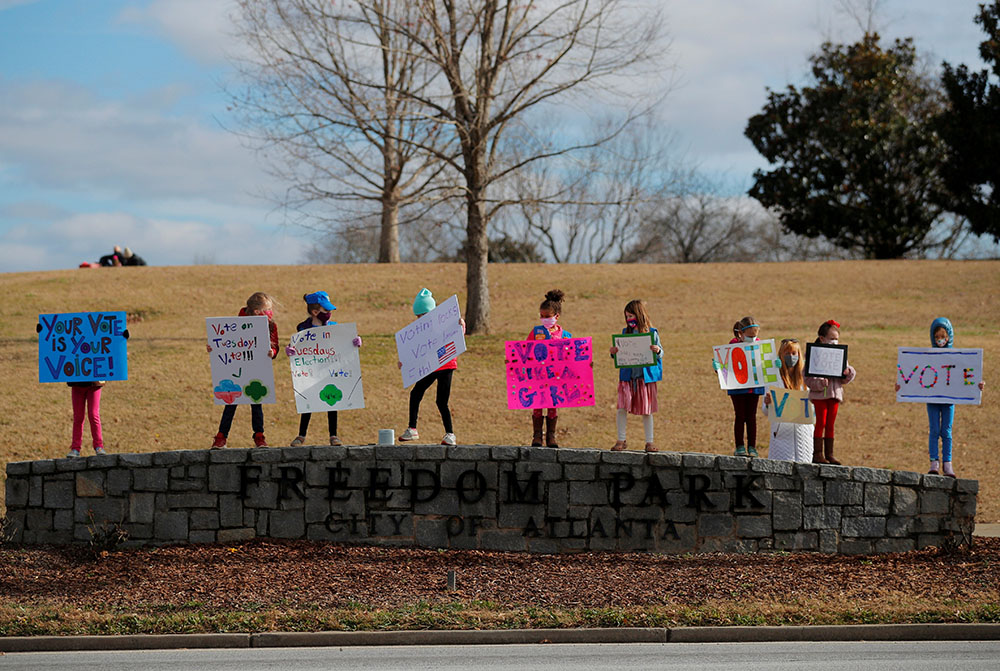
Girl Scouts in Atlanta hold signs urging residents to vote in the runoff election for both of Georgia's U.S. Senate seats Jan. 3. (CNS/Reuters/Brian Snyder)
Conservative Catholic philanthropists and pro-life leaders are key players behind efforts to limit voter access in a number of states, where such suppression could obstruct the right to vote for economically marginalized populations and racial minorities for years to come.
In the wake of the 2020 presidential election and Georgia's January senate runoffs, which delivered two Senate seats and a narrow congressional majority to Democrats, a number of Catholic-led organizations and donors have pumped millions of dollars into voter suppression efforts under the banner of "election integrity."
Other Catholics, however, view these initiatives as a betrayal of Catholic values and a perpetuation of the false claims by former President Donald Trump that the election was stolen. They fear such efforts could have serious consequences for the credibility of Catholic engagement in the public square and the pro-life cause.
"To the extent that they can bless voter suppression efforts with a fig leaf of Catholicism, then it makes these voter suppression efforts more palatable to the broader public, including the Catholic public," said Stephen Schneck, executive director of the Franciscan Action Network, which has prioritized promoting free and fair elections for all Americans.
"I'm very concerned," he said.
Catholics bankroll voter suppression efforts
In March, Georgia's legislature — a state with a long history of denying racial groups and impoverished populations the right to vote — passed new legislation that limits the window in which voters may request mail-in ballots, prohibits groups or individuals from passing out food or water at polling locations, reduces the number of drop boxes for early voting ballots, and enacts new voter ID laws that are likely to disproportionately affect low-income individuals and persons of color.
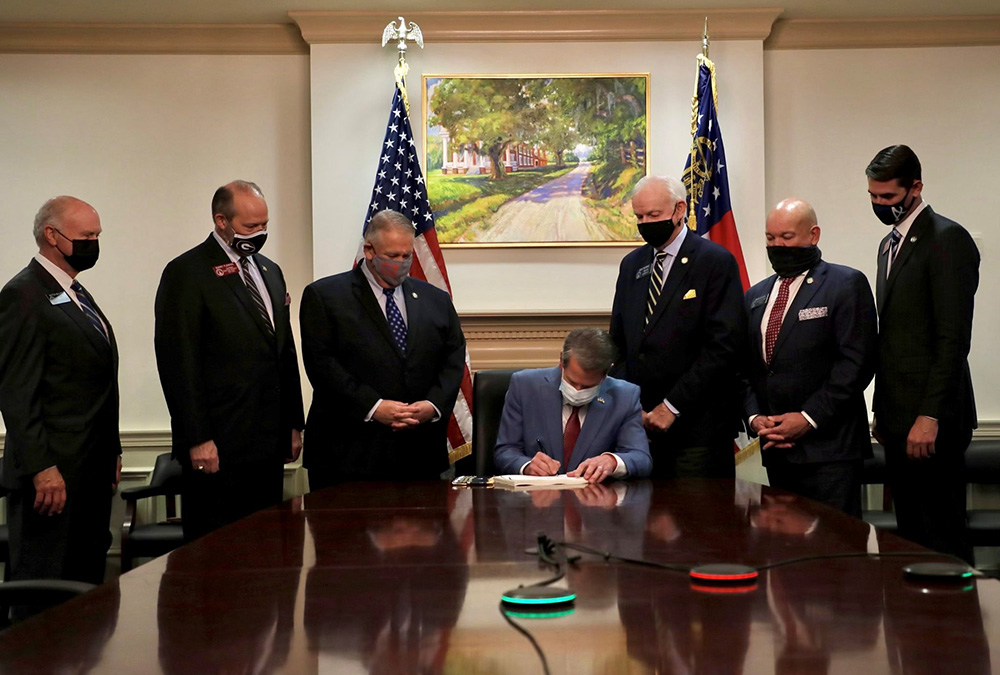
Georgia Gov. Brian Kemp signs the Election Integrity Act of 2021 in Atlanta March 25. (CNS/Gov. Brian Kemp, Twitter, Handout via Reuters)
In response, the Susan B. Anthony List, a pro-life advocacy organization, praised Georgia Gov. Brian Kemp for signing the bill into law, saying his "leadership has helped galvanize an election integrity movement surging toward restored trust & confidence in elections where it's easy to vote and hard to cheat."
The Susan B. Anthony List is led by Catholic convert Marjorie Dannenfelser, who spearheaded Trump's pro-life coalition in 2016 and 2020. During the 2020 election cycle, the organization and its related entities committed to spending $52 million to reelect Trump and Republicans in the U.S. Senate.
Shortly after Trump's defeat last November, the Susan B. Anthony List joined forces with the American Principles Project to launch the Election Transparency Initiative, a $5 million voting reform campaign targeting states with "close 2020 margins and a pro-life GOP-controlled legislature."
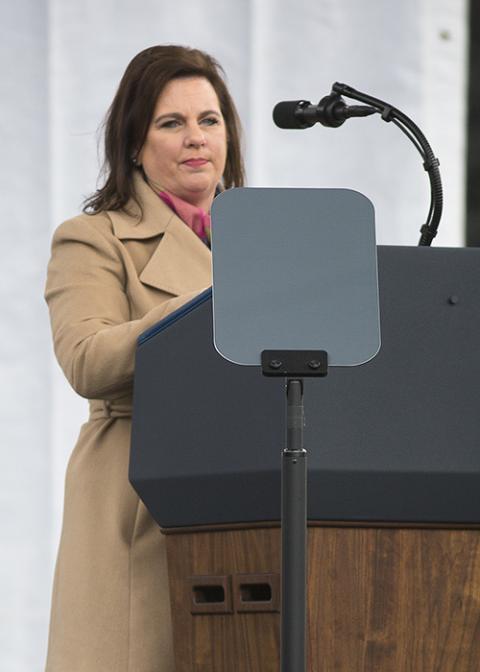
Marjorie Dannenfelser, president of the Susan B. Anthony List, speaks Jan. 24, 2020, during the annual March for Life rally in Washington. (CNS/Tyler Orsburn)
The American Principles Project bills itself as the "only national pro-family organization engaging directly in campaigns and elections." Its move toward a focus on voting access was a response to a threat from their donors: Change strategies or the coffers will dry up.
" 'Before I give you any money for anything at all, tell me how this is going to be solved' " is how the organization's founding president, Frank Cannon, summarized conversations with funders in an interview with The New York Times last month.
A key backer to the two organizations behind the Election Transparency Initiative is Catholic philanthropist Sean Fieler, president and chief investment officer of the New York City hedge fund Equinox Partners. Fieler is a board member of the Susan B. Anthony List and chairman of the American Principles Project board. According to their most recent tax filings, both organizations share an office space in Arlington, Virginia, and Cannon is a strategist for both groups.
Fieler also serves as a board member of the Manhattan Institute, the Acton Institute, the Witherspoon Institute, and is the chairman of the Knights of Columbus Charitable Fund. According to a 2019 interview, his Chiaroscuro Foundation has given at least $34 million to pro-life and religious liberty groups and other Catholic and conservative causes.
Along with Fieler and Cannon, the American Principles Project's two other board members are also Catholic.
Board member Ellen Barrosse is a Dame of Malta and a former national co-chair of the Donald J. Trump for President Pro-life Coalition.
Princeton University Professor Robert P. George, also one of the project's founders and a current board member, is one of the nation's leading conservative constitutional law scholars and also serves on the board of the Heritage Foundation, which through its advocacy arm, Heritage Action for America, plans to spend $24 million on voter restriction efforts.
Leading the joint effort by the American Principles Project and the Susan B. Anthony List is fellow Catholic Ken Cuccinelli, who served as the director of U.S. Citizenship and Immigration Services under Trump and is the former Virginia attorney general.
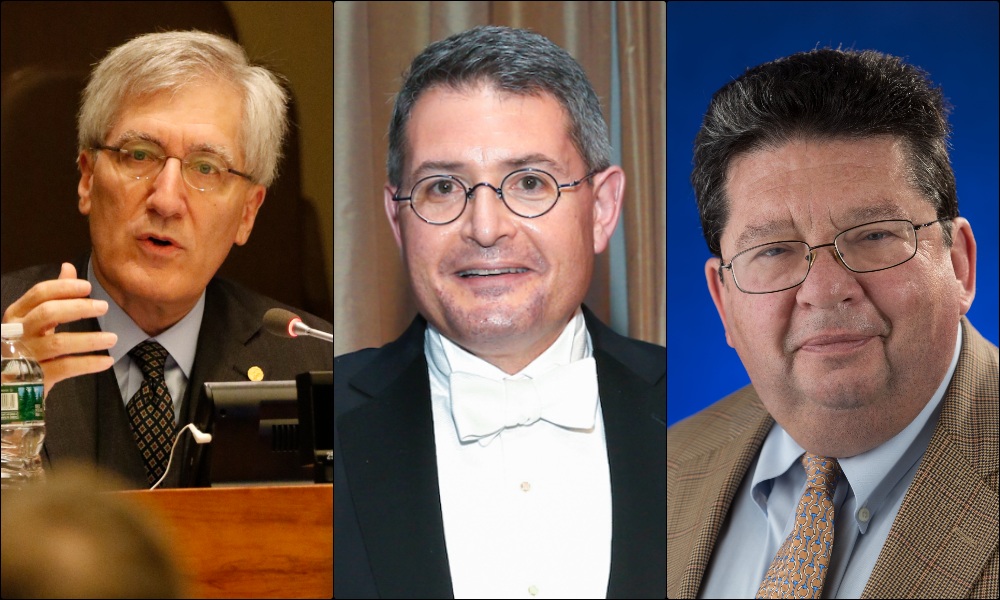
From left: Robert P. George (CNS/Paul Haring); Leonard Leo (Becket); Frank Cannon (americanprinciplesproject.org)
In a parallel effort, the Honest Elections Project, which warns that the legitimacy of elections is under attack, is financially backed by Leonard Leo's 85 Fund, which has pledged tens of millions of dollars into conservative election efforts across the country.
Leo, a legal activist and past president of the Federalist Society, has led efforts to seat a number of justices on the Supreme Court and scores of other judicial appointments throughout the country. He is a prominent Catholic involved in funding a number of conservative Catholic and pro-life causes, including as a member of the Knights of Malta and serving on the board of Students for Life of America and the Catholic University of America and as president of the board of the National Catholic Prayer Breakfast.
NCR's requests for comment from Fieler and a spokesperson for the Election Transparency Initiative were not returned.
A 'wink and nod' to the lie
Following the launch of the Election Transparency Initiative, the project's point man, Cuccinelli, gave an interview with RealClearPolitics, in which he observed that conservative leaders "are clearly getting feedback from their members and their universe that is sort of questioning, 'Why should we put this much effort into a system that cheats us?' "
"I'm not saying it does or doesn't, but that is the perception of many of them," he added.
Trump's own U.S. Justice Department and former Attorney General William Barr concluded there was no widespread election fraud in the 2020 election.
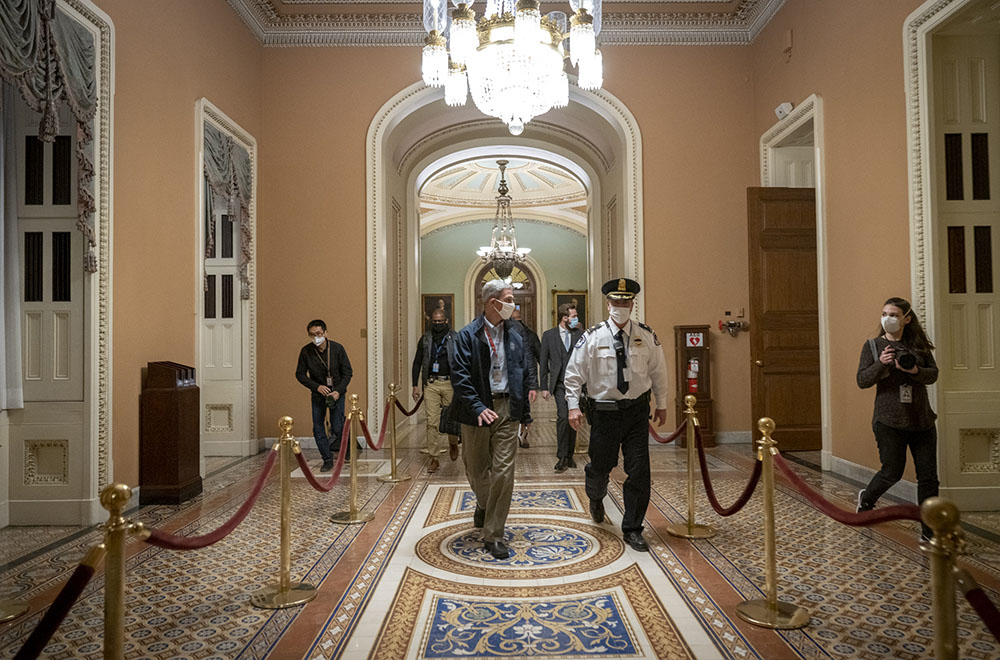
Ken Cuccinelli, then with the Department of Homeland Security, tours the U.S. Capitol to survey damage from violent protests earlier in the day on Jan. 6 in Washington, D.C. (Wikimedia Commons/U.S. Department of Homeland Security)
Cuccinelli's response is representative of how a number of conservatives have offered a "wink and a nod" to the lie that the election was rigged and are now using that falsehood to advance their particular agendas, according to Chris Crawford, a senior associate at Democracy Fund. Crawford led faith outreach during the 2020 election for the National Task Force on Election Crises, a cross-partisan group of experts on election security and promoting free and fair elections.
"There's this way of speaking about 2020 that some Republican leaders have engaged in, and that Cuccinelli in particular has engaged in," he told NCR, "which is to put forth this idea that the system is rigged and that the election was stolen, but then to back away and try to leave it as though it's undecided and say that 'the election may have been stolen, but I'm not saying it was.' "
"That's an obfuscation of the truth," said Crawford, adding that "there's this willingness to entertain former President Trump's lie about the 2020 election for political gain that I think is counter to the way we're supposed to be living as Catholics."
"Former President Trump just makes stuff up and straight out lies, and I think it's important we don't enable that behavior while trying to give ourselves wiggle room to say, 'We're not saying the same things he's saying,' while still trying to fuel that fire," added Crawford.
Kim Daniels, co-director of Georgetown University's Initiative on Catholic Social Thought and Public Life, concurred, saying, "Social conservatives rightly note the importance of telling the truth even when it's unpopular."
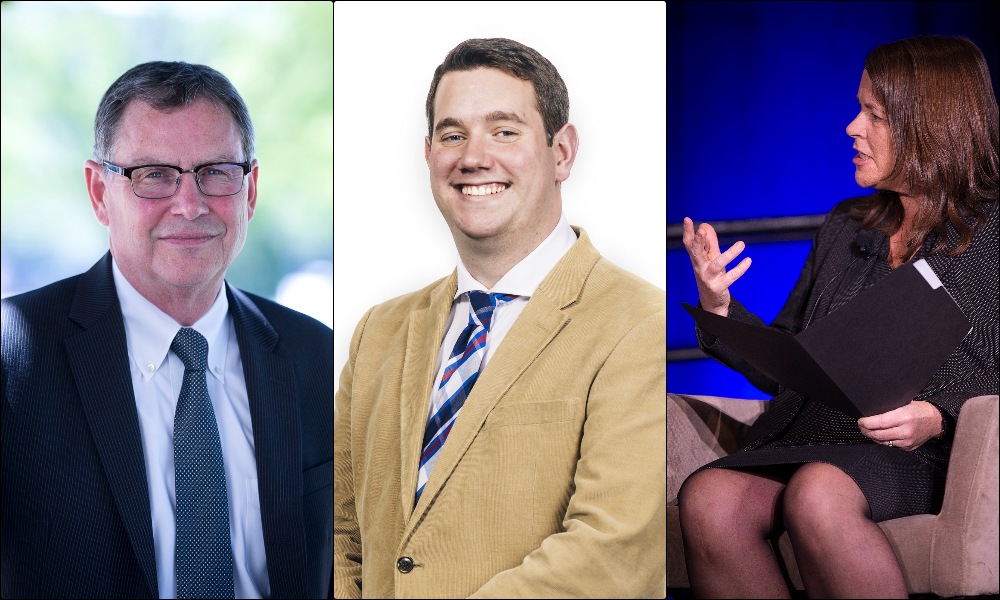
From left: Stephen Schneck (CNS/Tyler Orsburn); Chris Crawford (Courtesy of Democracy Fund); Kim Daniels (CNS/Tyler Orsburn)
"Among some social conservatives," she told NCR, "right now it's unpopular to speak one particular truth: that former President Trump lost a free and fair election. Leadership means recognizing and grappling with this fact, not leaning into efforts to undermine it."
Both Crawford and Daniels have been active in the pro-life movement for many years and are concerned that Catholic pro-life leaders seem to have embraced a strategy motivated by partisan politics rather than objective truth.
"Instead of talking about how best to protect and support unborn children and their mothers, some pro-life groups are lobbying and fundraising for racially charged voter restriction efforts," said Daniels. "It's another sign of the moral costs of the transactional politics of the last four years."
"At its best, the pro-life cause has been about expanding the circle of those whose rights our laws protect, not shrinking that circle," she added. "It's been about giving voice to those without a voice. These voter restriction efforts are the opposite of that."
According to Crawford, whether it's election reform, abortion or any other public policy fix, "as Catholics everything we do, especially in public life, should be grounded in truth."
"That is central to living out our public life to be grounded in the truth," he said. "You can't have a process that you say is fixing a problem when the problem didn't exist. You can't start from the position that the 2020 election was unfair and then say that you are on the side of building trust in our elections."
"And you can't build trust in our elections on the foundation of the former president's lie," he added.
The Know-Nothing Party 2.0
Franciscan Action Network's Schneck said that he sees a tragic parallel between the Know-Nothing Party's efforts in the 19th century to fuel suspicions of Irish Catholics and limit their participation in public life, and voter suppression movements today in states like Georgia.
Schneck called such efforts "anti-Catholic" and told NCR it is "shocking" to see them supported, led and funded by his fellow Catholics, especially luminaries of the pro-life cause.
"One of the pro-life arguments that we make is that abortion targets the poorest among us, and in particular, people of color," he said. "How can we make that kind of claim and yet engage in voter suppression efforts that are designed to keep people of color and these poor populations from participating in the vote?"
Advertisement
"Populations suppressed by these efforts will be people of poverty, those already on the margins of society and already oppressed, the people Pope Francis has called the 'thrown away,' and frankly, it's going to be Black and brown people," Schneck added. "These efforts at suppression will further marginalize and deny people of color, including many of our own Catholic immigrant brothers and sisters, and deny them from having a voice in our community. This divides society further into the haves and have-nots."
Fr. Bruce Wilkinson, a priest of the Atlanta Archdiocese, said that seeing his fellow Catholics engage in efforts to keep Black Catholics away from the polls is "sadly, not just a recent event."
"For too long, what I've seen happening among certain circles in the church is that they fear losing control and believe that if you suppress the other side and make it more difficult for them to speak or air their views, somehow you're speaking for God," Wilkinson, who is Black, told NCR.
Wilkinson has vowed to fight the recent Georgia law as well as "disinformation within the local church," but he said that Black Catholics "need to hear from the highest levels" of the church that they recognize there is a problem when it comes to restricting access to voting. Church officials also need to be willing to stand in solidarity with those who are being disenfranchised.
To date, neither the U.S. Conference of Catholic Bishops nor the Georgia Catholic Conference has issued statements on the state's legislation.
Crawford believes Catholics of all political persuasions should be able to get on board with affirming the right to vote without interference.
"The starting point for Catholics across the political spectrum should be affirming our support that every person who is eligible to vote should be able to vote," he said. "We should all believe in the right to vote for every eligible voter and that shouldn't be a partisan issue."
"We should focus on making it as easy as possible to vote for eligible voters and then focus on winning those voters to your cause," he continued. "I think that's the sort of public square we should want as Catholics."








